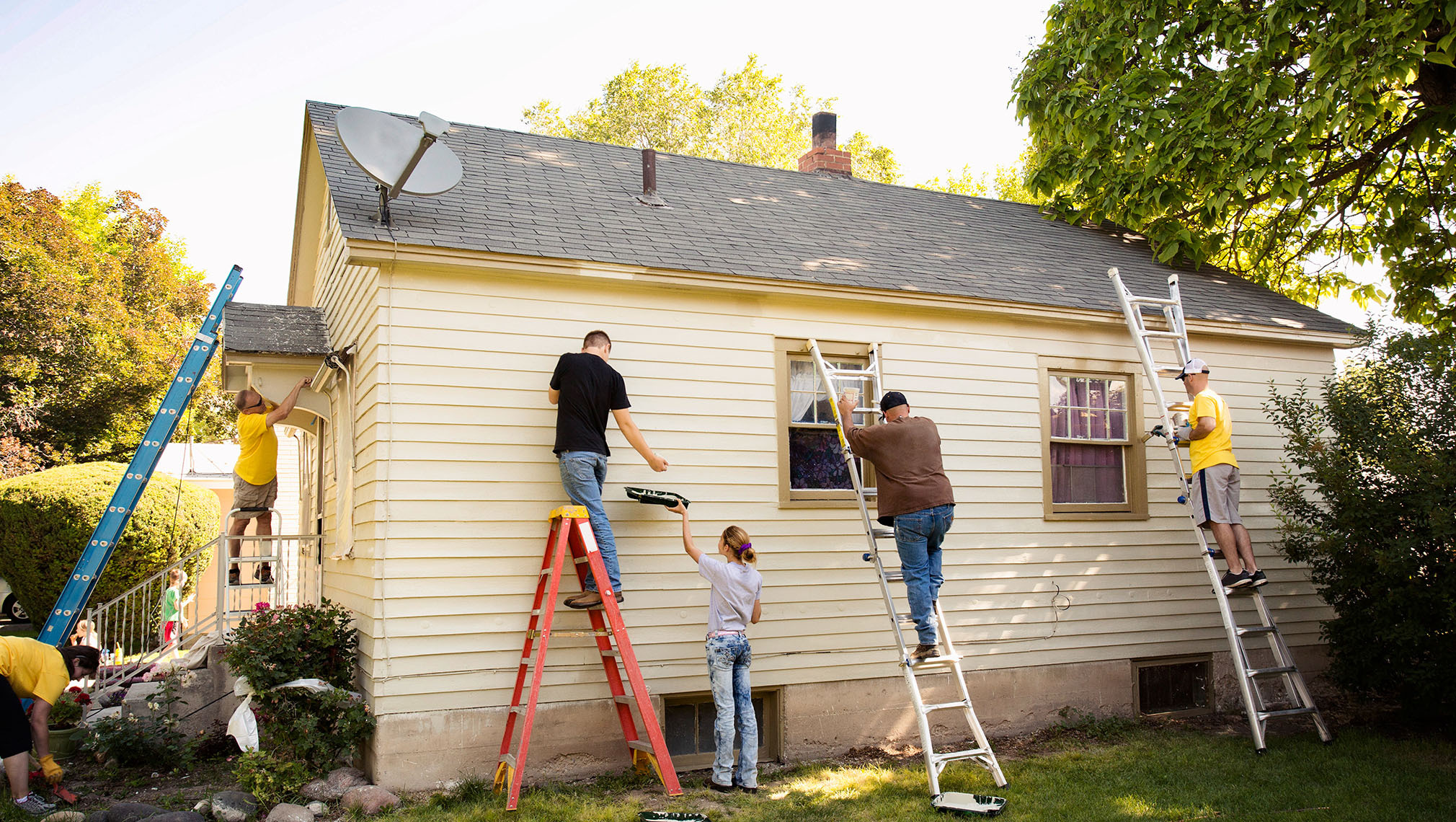
Dawn Allcot
Fri, June 24, 2022, 10:55 AM·2 min read
Housing prices could drop by as much as 10% in many U.S. cities, per Fortune, referencing a new report from Moody’s Analytics. However, the dip won’t represent a national home price correction, according to Moody’s chief economist Mark Zandi.
Rather, per Zandi, within the next 12 months, home price growth will reach zero year-over-year. Some of the most overpriced housing markets will experience declines, he predicts.
Zandi attributes the cooling market to rapidly rising mortgage rates in an already-overvalued market. He doesn’t consider the current prices to represent a housing bubble, because the market overvaluation isn’t accompanied by speculation, he told Fortune. However, he noted that he sees some “speculation creeping in” to markets like Phoenix and Charlotte, which are overvalued by 46% and 33%, Fortune reports.
Fortune also published an interactive chart showing the most overvalued markets. Values range from -6%, meaning that home prices are lower than expected when factoring in local incomes, up to 73% in Boise, Idaho, the most overvalued city in the country.

Some of the most overvalued cities (and regions) where home prices could be expected to drop by 5% to 10% over the next 12 months, include:
- Boise, ID — 73%.
- Sherman-Denizon, TX — 60%.
- Muskegon, MI — 59%.
- Morristown, TN — 57%.
- Homosassa Springs, FL — 57%.
- Lake Havasu City — Kingman, AZ — 56%.
- Kahului-Wailuku-Lahaina, HI — 55%.
- Dalton, GA — 55%.
- Flagstaff, AZ — 51%.
- Pocatello, ID — 49%.
- Bremerton-Silverdale-Port Orchard, WA — 48%.
- Albany-Lebanon, OR — 48%.
- Idaho Falls, ID — 48%.
- Nashville-Davidson-Murfreesboro-Franklin, TN — 48%.
- Palm Bay-Melbourne-Titusville, FL — 48%.
- Clarksville, TN / KY — 48%.
- Bellingham, WA — 47%.
- Myrtle Beach-Conway-North Myrtle Beach, SC / NC– 47%.
- Phoenix-Mesa-Chandler, AZ — 46%.
- Cleveland, TN — 46%.
- Asheville, NC — 46%.
- Flint, MI — 46%.

贷款利率飙升,今夏房价将继续上涨,但增速有所放缓
去年在美联储宽松政策下,抵押贷款利率下行,美国购房需求旺盛;今年随着美联储开启加息周期,抵押贷款利率开始飙升,但专家表示,美国地产市场到2022年不会有太大的缓解。
随着美国通货膨胀以四十多年来最快速度上升,抵押贷款利率的上升和物价飙升,人们愿意支付的房价可能会受到压力。
《华尔街日报》报导,虽然出现全国性房价下跌的情况很少见——触发了2008—2009年金融危机的楼市崩盘是罕见例外,但会出现房价涨幅落后于通货膨胀的时候,这实际上使住房在一段时间内更容易负担。
对可负担住房的追逐可能会带来人们购买的房屋类型和购置区域的变化。例如,根据美国全国地产经纪商协会(National Association of Realtors)的数据,2月份西部地区成屋销量同比下降了8.3%,但在房价中值相比西部低近20万美元的南部地区,成屋销量增长了3%。
以下是多名专家对2022年美国房市的多方预测。
1. 高价房屋的竞争可能会减少
美国抵押贷款利率正在上升,本月,30年期固定利率抵押贷款的利率超过5%,这是自2011年以来首次,专业人士表示利率可能会继续上升。
“大多数买家的出价范围取决于他们每个月能负担多少,随着利率的增加,抵押贷款付款会增加。因此,抵押贷款利率的上升意味着购房者将不得不调整他们的预期,并开始在较低房价范围内选择。”个人理财公司Nerdwallet的房屋和抵押贷款专家霍尔顿‧刘易斯(Holden Lewis)对“市场观察”(Market Watch)说,“我们可能会看到对高价房屋的竞争减少,而对低价房屋的竞争会更多。”
2. 买家的选择有限
Realtor.com首席经济学家丹妮尔‧黑尔(Danielle Hale)对福克斯新闻表示,待售房屋的数量已经超过季节性低点,但仍然滞后。
黑尔说,我们正在进入挂牌售房“一年中最好的时间”,并且有更多卖家进入市场。尽管如此,黑尔警告说,“整体格局仍然是买家选择有限的局面。”
她补充说,待售房屋的销售速度很快。
“即使抵押贷款利率达到11年来最高点,房屋的要价和销售价格仍在继续上涨,购房者的预算正在捉襟见肘。”黑尔说。
根据黑尔的说法,目前,典型待售房屋的融资成本已经增加了大约40%,几乎是总体通货膨胀率的五倍。
3. 房贷利率上升或迫使部分买家退出市场
美国全国房地产经纪人协会首席经济学家劳伦斯‧云(Lawrence Yun)对“市场观察”表示:“由于利率上升对负担能力的打击,许多买家将被迫退出市场。”
“15%的房价上涨和现在高达5%的利率,增加了每月抵押贷款支付数额……肯定远远高于人们的收入增长和消费价格通胀。”他说。
4. 租金上涨伤害首次购房者
由于日常必需品成本的上涨,首次购房者并没有看到房屋净值和财富增长。
黑尔对福克斯新闻说,对于这些买家来说,在原本已经充满挑战的房地产市场,租金上涨使得首次买房者难以为首付存钱。
例如,3月是单间至两居室房产租金连续第八个月增长达到两位数。
根据Realtor.com的数据,美国50个最大的大都市租金中位数达到了创纪录的1,807美元。
黑尔说,现在,锁定住房成本,以防止不得不支付更高未来租金的动力正在增加。
5. 房价将继续上涨 但增速有所放缓
《财富》杂志本周报导,包括CoreLogic和房地美(Fannie Mae)在内的每家有公开预测的大型房地产公司都预测,来年房价将进一步上涨。
但专业人士表示,对买家来说,好消息是房价增长在2022年可能会有所放缓。Zillow表示,年度房价增长将“在整个春季继续加速,在5月份达到22%的峰值,然后到2023年2月逐渐放缓至17.8%。”
Zillow经济学家妮可‧巴肖(Nicole Bachaud)对“市场观察”解释说:“由于足够多的买家在价格上涨和抵押贷款利率之间达到承受能力上限,因此需求回落,我们将看到今年晚些时候价格增长放缓。”
“抵押贷款利率的急剧上升正在将更多购房者赶出市场,但它似乎也阻止了一些房主出售房子。由于供需双双下滑,市场不太可能很快从卖方市场转向买方市场。”房地产经纪公司Redfin首席经济学家达里尔‧费尔韦瑟(Daryl Fairweather)在一份声明中表示。
黑尔预计,“随着销售减少和卖家增加,市场将更加平衡”,房屋签订合同的价格和速度将会放缓。
尽管如此,“部分由十年来建房不足所驱动的失衡严重程度,可能意味着房地产市场会缓慢降温。”她补充道。
根据黑尔的说法,这意味着购房者和租房者“应该准备好迅速采取行动”,包括在寻找房屋或出租地点之前有条不紊地打理财务,并对自己是否能负担得起充分了解。
6. 雇员重返办公室 或影响住房选择
Realtor.com高级经济学家乔治‧拉修(George Ratiu)对“市场观察”说:“四月可能会见证消费者活动的更广泛改善,包括随着(瘟疫)大流行限制的消退,以及我们进入新常态而旅行增加。虽然公司转向办公环境并试图让员工回到办公室和拥挤的通勤中,但加薪跟不上汽油、午餐、服装和日托成本的增加,将导致员工对灵活性(工作)的需求。过去两年远程工作的成功不仅重新定义了就业文化和期望,还让美国人有机会在远离高成本市中心的地方寻找更多经济适用房。”
他也表示,一些认为自己不必亲自重返办公室的人实际上可能不得不重返工作岗位,这意味着可以看到人们从他们在瘟疫大流行高峰期购买的更多郊区房屋,搬回城市地区。
Source: Mortgage Reports
Is buying a house still worth it?
Home prices continue to climb. And interest rates have gone up as well, increasing the cost of homeownership from month to month. Unsurprisingly, many home buyers are left wondering: Is buying a house still worth it in 2022?
The short answer is yes. If you’re financially ready, buying a house is still worth it — even in the current market. Experts largely agree that buying and owning a home remains a smarter financial move than renting for many.
If you’re on the fence about a home purchase in 2022, here’s what you should consider.
In this article (Skip to…)
Benefits of buying a house in 2022
Despite the financial challenges of the current market, there are plenty of reasons why buying a home is still worth it in 2022.
1. Rising prices lead to increased equity
One of the chief benefits of owning a home is that over time, increased home equity can add to your net worth and give you a low-cost source of cash as needed. The ability to build equity is what sets homeownership apart from renting, which has no return on investment.
“Home buyers who purchase a home today are still likely to see rising property values and increased home equity. That’s because supply is still relatively low compared to buyer demand, so home prices are likely to keep rising, although at a slower pace,” notes National Association of Realtors (NAR) senior economist Gay Cororaton.
“When you couple [fixed mortgage payments] with the fact that rents are increasing at record levels, it makes more financial sense to own a home and gain the equity”
–Jason Gelios, Realtor
Cororaton points out that, even with rising mortgage rates, home prices have held up. As of March 2022, the median sales price was up 15% year-over-year.
“Although home prices have fallen approximately 30% from their peak level in 2006, they have rebounded over the years, with the median single-family existing-home sales price rising at an annual pace of 3.4% from the fourth quarter of 2006 through the fourth quarter of 2021,” Cororaton adds.
Using this metric, if you bought a home 15 years ago, you likely would have accumulated $197,500 in home equity — $141,700 of which would be price appreciation.
“Over the past 30 years, a homeowner who purchased a typical home and sold it today would likely have built up equity of $360,700,” she continues.
2. Homeownership means fixed housing costs
What’s extra nice about buying a home with a fixed-rate mortgage is that “even though the value of your home will increase, your monthly principal and interest payment will remain the same over the life of your loan,” says Jordan Fulmer, owner of Momentum Property Solutions in Huntsville, Alabama.
Jason Gelios, a Michigan-based Realtor, points out that that owning real estate is still the top way to create generational wealth. “When you also couple this reasoning with the fact that rents are increasing at record levels, it makes more financial sense to own a home and gain the equity.”
“There aren’t too many investments that can provide the returns that real estate can,” he says.
3. Owning gives you opportunities renting doesn’t
Of course, there are several other advantages to buying a home today. These include:
- The ability to customize your home the way you see fit, unlike a rental unit that likely won’t allow for personalization
- Greater privacy from neighbors, especially if you select a single-family detached home
- Home equity that can be tapped via a home equity loan or home equity line of credit (HELOC). This money can be used to fund home improvement projects, pay off debt, cover the cost of a wedding or other major expense, or virtually anything you desire
- The ability to claim a mortgage interest deduction on your taxes if you finance your property
- The chance to build a stronger credit rating and improve your credit score if you finance a mortgage and pay your bills on time
And then there are other, less tangible benefits many homeowners experience. For instance, you’ll likely have more room to raise a family and grow your household. And you may build roots in your community and enjoy greater stability over time. Consider that renters are four times more inclined to relocate in a given year versus homeowners, per the U.S. Census.Verify your home buying eligibility. Start here (May 22nd, 2022)

Disadvantages of buying a home in 2022
Of course, buying a house isn’t going to be the right move for everyone. There will be certain downsides to homeownership in any market — particularly the current one. Here’s what experts say prospective buyers should watch out for.
“One of the biggest disadvantages is the fierce competition buyers face nowadays. It’s really a dog-eat-dog market for buyers, making it more stressful to win a bid on a home,” says Gelios. “Purchasers will need to move quickly and be aware of what they are looking for in a home.”
Additionally, it’s getting more expensive to win bidding wars, leaving many would-be homeowners owners out in the cold. You don’t want to jeopardize yourself by borrowing more money and/or paying a higher interest rate than you can afford.
Furthermore, there is no guarantee that your home will continue to increase in value at the rate residences have over recent years. The NAR anticipates home price appreciation to slow to 5% by the end of the year — a rate of appreciation in line with historical norms.
But, while property values won’t continue to skyrocket as we saw in 2020 and 2021, they should keep growing over time. And even at a slow rate of appreciation, this leads to significant equity growth, making homeownership one of the best investments available.
Is it smart to buy a home with home prices so inflated?
Naturally, some home shoppers worry that buying a home is a waste of money because home prices are inflated — and if they drop, it could mean a net financial loss for those who buy at the peak of the market.
However, The experts we’ve interviewed throughout 2022 agree that a housing crash is highly unlikely.
“I don’t believe there will be a nationwide crash. For a crash to occur, the supply and demand situation would have to flip upside down, with more inventory existing than the number of buyers,” Fulmer explains.
“However,” he continues, “I believe that many markets around the country have seen artificial inflation over the last couple of years. These markets will likely see significant corrections due to rising interest rates and other economic factors.”
“If you are purchasing in an area with consistent growth and a robust economy, you likely have nothing to worry about when paying above the asking price on a house… In these markets, the value will likely continue to rise above what you paid for the house.”
–Jordan Fulmer, Owner of Momentum Property Solutions
Gelios agrees that we are not in a market bubble. “Unlike what we saw back in 2008, there are no current indicators of a housing market crash occurring. For example, we continue to have competitive homebuyers who are willing to pay cash above the asking price and a healthy job market with many positions being unfilled — two signs that we are in no way headed toward a crash.”
He adds, “Even with inflation increasing the prices of everything from groceries to automobiles, we won’t see the housing market go down anytime soon. The demand for homes will remain with us for a long time, especially as first-time buyers reenter the market this year to get their shot at owning a home.”
Keep in mind that most people shopping for homes today are millennials who have postponed buying a house and are eager to become first-time homeowners. As Gen Y continues to feel pressure to accommodate their partners and children, they will join in hunting for and buying homes. That means pricing pressures aren’t going anywhere.
“If you are purchasing in an area with consistent growth and a robust economy, you likely have nothing to worry about when paying above the asking price on a house — assuming you can afford the monthly payment,” adds Fulmer. “In these markets, the value will likely continue to rise above what you paid for the house.”Verify your home buying eligibility. Start here (May 22nd, 2022)
Buying versus renting in 2022
While home prices have increased rapidly over the past two years, renting isn’t always a more affordable alternative. Rent prices have been skyrocketing in many places, too.
“We are seeing rental increases of $300 extra per month in my market. That impacts how much you can spend on your basic life necessities like groceries, gas, and utilities,” says Christian Ross, managing broker at Engel and Volkers in Atlanta. “There is also a persisting shortage of rental supply in many markets, meaning you may have an easier time finding a home for sale than a rental.”
Housing payments vs. rent payments
“I would focus more on your monthly payments than the likely prospect of home appreciation and increased equity,” he continues. “If your mortgage payment will be less than you would pay in rent for a similar house, you should probably go ahead and purchase a home.”
Suzanne Hollander, a real estate law professor at Florida International University in Miami, says it’s crucial to perform your due diligence here.
“To know if it’s more expensive to buy or rent in your market, you need to do your homework and calculate the math. Learn the sale prices of comparable properties in your area and the rental prices for leased properties. Calculate the amount of your monthly mortgage payments based on your research of the likely sale price compared against the amount of your expected monthly rental payment,” she recommends.
Mortgages are fixed, rents are not
Keep in mind that if you choose a fixed-rate mortgage loan to finance a property, your monthly principal and interest payments will stay the same throughout your loan’s term. (Though keep in mind that property taxes and homeowners insurance rates can increase over time.)
“In contrast, rental rates are not predictable,” says Hollander. “Normally, a tenant signs a one-year rental contract. And at the expiration of the contract, the rental rate will probably increase. Only five states and the District of Columbia have rent control laws in place.”
If you expect a job relocation or a move in the next few years, it may be more advantageous to rent than purchase, however. That’s partially because you’ll incur closing costs on a home purchase, which may equal 2% to 5% of your borrowed amount. It will probably take a few years to recoup those costs, which requires staying put.
Your next steps
Still undecided about buying versus renting?
“Consult with an experienced Realtor and mortgage lender, who can help you explore what options are available at your budget and shine a light on your financial situation,” advises Ross.
Also, carefully research the state of your local market.
“If there is an influx of jobs, there will probably continue to be more buyers and sellers, resulting in continued growth in home prices,” says Fulmer. “In a less robust market, it might be smarter to continue renting in anticipation of a possible market correction and lower home prices.”
The bottom line? Provided your finances are in order, your job is secure, you can afford the monthly payments, you’re working with a skilled real estate agent, and you will remain in place for at least a few years, buying a home will not be a waste of money in 2022, the pros agree.

Buying a Fixer Upper: How to Find, Afford and Improve a Fixer-Upper Home
Searching for your dream home and wondering if it’s worth buying a fixer-upper and making it your own? Here’s what you need to know.
In this article:
- What is a fixer-upper home?
- Should I buy a fixer-upper home?
- How to find fixer-upper homes
- What to look for when buying a fixer-upper home
- How to buy a fixer-upper
- Financing options with fixer-upper loans

While the process of buying and renovating fixer-upper homes has increased in popularity due to fix-and-flip home improvement TV shows, not everyone is cut out for major renovation projects.
In fact, only 19% of homeowners said their home needed serious updates, and only 3% said their home needed a complete overhaul, according to the Zillow Group Consumer Housing Trends Report 2020.
Buying a fixer-upper involves purchasing the least desirable home on the block and overseeing its transformation. Whether you’re considering a fixer as an investment — and you plan to sell after construction is complete — or you’re fixing up a home to make it your own, there’s a lot to consider when buying a fixer-upper, from home price to construction costs to financing.
What is a fixer-upper home?
A fixer-upper is a home that needs repairs, but not so many that it’s uninhabitable or worthy of being torn down.
Fixer-uppers are usually offered for a lower price than homes in better condition, which makes them appealing to buyers looking to maximize their purchasing power or investors looking to flip the property and turn a profit.
Should I buy a fixer-upper home?
Most often, people buy fixer-upper homes because the cost of purchasing the home plus renovation costs may total less than what they’d pay for a comparable home in good condition.

Here are some of the key reasons buyers decide on buying a fixer-upper:
Reduced price
If you have your eye on a popular neighborhood, either for resale value or your own lifestyle, you may be able to get a better deal buying a fixer upper in your desired location and renovating it than purchasing an already-updated home.
Customizable improvements
When you purchase a fixer-upper, the sky’s the limit when it comes to fixtures and finishes (within your budget, of course). Renovating a fixer-upper can be ideal for buyers with very specific tastes or those who want more control over the aesthetics of their home. When buying a fixer-upper, you avoid paying for the renovations someone else completed, especially if you don’t like them.
Older home charm
The character of older homes isn’t easy to replicate. Buying an older home in need of some TLC can allow you to restore and maintain time period details, while bringing the home up to today’s efficiency, safety and comfort standards.
Make a profit
Whether you’re planning to flip or live in the home for a few years before selling, you may be able to turn a good profit based on the renovations you make. Your return on investment depends on the types of renovations you complete, the materials you use and the quality of the work. If profit is the goal, select popular home improvements in your market to increase property value and appeal to a wide variety of buyers.
Tax incentives
In some metropolitan areas, such as Philadelphia and Cincinnati, buyers who purchase a fixer-upper and renovate to improve the property value may be eligible for a tax abatement or credit.
How to find fixer-upper homes
Finding the right fixer-upper is all about where you look. Here are a few strategies for finding the right home.
Want to find fixer upper homes in your area? Narrow down your search using the Keyword section of the Zillow app.
Search online: Use Zillow to search for homes below market value. You can search keywords such as “fixer upper,” “needs work” or “TLC” to narrow down potential properties.
Work with an agent: A local buyer’s agent should be able to help you find fixer-upper homes in your desirable neighborhoods. Well-connected agents may even be able to show you homes that haven’t hit the market yet, via word of mouth.
Search auctions, foreclosures and short sales: Distressed properties may be in fine structural condition but are sold below market value in order to offload them quickly. It’s important to note that these homes are usually sold as-is, and disclosures might not be available, so be sure you have enough extra money in your budget to cover surprise issues.
What to look for when buying a fixer-upper home
When shopping for a fixer-upper, prioritize the things you can’t change about a home (like its location), or things that would be too costly to change (like significant structural renovations). Here are key factors to consider:
Location
Location is the most important thing to look for, because it can’t be changed. Look for a fixer-upper in a desirable or an up-and-coming neighborhood in order to maximize potential resale value. Finding the right location will also ensure that you’re happy in the home. Pay attention to things that might be important to you, like school ratings, nearby parks and restaurants and commute times.
The home’s location will also play a part in determining your renovation budget and estimating the home’s post-renovation value. The quality of finishes and upgrades you select should be in line with comparable homes in the same neighborhood if your goal is to recoup costs on resale.
Layout and size
With a fixer-upper, you might be able to change the layout as you see fit, but pay attention to any design and layout ideas that would require removing load-bearing walls. This can be a costly exercise, and sometimes it’s just not possible. Home additions to increase square footage are also expensive and might not be allowed, depending on local zoning requirements and laws.
Home condition
There’s a difference between a fixer-upper and a home with significant structural defects. Structural and mechanical problems are a lot more expensive to fix than cosmetic ones. Be sure to hire a home inspector to gain knowledge of the home’s positives and negatives — hiring a home inspector is an invaluable step, even if you’re buying a home as-is. Here’s what should be on your home inspection checklist for a fixer-upper:
- Strong foundation
- Up-to-code electrical
- Proper plumbing
- Solid roof condition (should come with roof certification)
- HVAC and/or central AC
- Functional windows
Straightforward cosmetic updates
Prioritize homes that have outdated or worn out finishes that don’t appeal to the general public but can be updated affordably and without too much effort. Ideally, the fixer-upper you buy will only need cosmetic upgrades. Look for homes with:
- Peeling or dated paint (interior and exterior)
- Older bathroom fixtures and tile
- Dated kitchen cabinetry
- Laminate or tile countertops
- Stained carpeting
- Hardwood floors in need of refinishing
- Leftover belongings or trash that need to be removed
- Neglected landscaping
- Old or non-functioning appliances
How to buy a fixer-upper
Buying a home that needs work can be risky, because you won’t know the full condition of the home until you start tearing down walls. That’s why doing your due diligence on the property and neighborhood ahead of time is key.
Get a professional home inspection
When you put an offer on a house, be sure to include an inspection contingency. An inspection contingency allows you to back out of a deal and get your earnest money deposit back if the inspection reveals that the home has serious hidden defects.
Even homes marketed as being in “as-is condition” can be inspected — the only difference is with an as-is home, the seller is telling you that they do not want to make any repairs based on your findings.
The buyer is responsible for the cost of an inspection, which ranges between $250 and $700, depending on the size of the home and your location. In addition to a general inspection, you might also opt for specialized inspections for trouble areas. Common specialty inspections include pests, sewer lines, radon, lead-based paint and structural inspections. Costs for specialty inspections are similar to general inspections.
A structural inspection reviews the home’s structural integrity, but also lets you know of any natural hazards nearby that could impact the resale value or your own health and safety. You may also consider hiring a structural engineer to assess the property before you make an offer. It will cost between $500-$700 but could save you thousands of dollars in future foundation repairs.
Hire an architect and general contractor
An architect can create a new layout for a home, create plans and blueprints and tell you what is and isn’t possible. Some cities require you to submit architectural plans to acquire home permits, making an architect a necessity. The average cost for an architect is around $5,000, depending on the scope of your project.
Your home inspector should be able to give you a rough estimate of what it would cost to adequately repair problem areas that come up in an inspection, but since they’re not the one who will be doing the work, it’s best to get a more accurate quote from a contractor. Whatever they quote you, add a 10% contingency for any problems that come up along the way. Be sure to get quotes from a few contractors and do your due diligence in checking their licensing and customer reviews.
Budget for improvements
Working with your contractor, be sure that your budget takes into consideration all applicable costs. Don’t forget to include:
- Permit fees, if applicable
- Cost of materials, like flooring, paint, light fixtures, cabinetry, countertops and hardware
- Cost of labor, including general contractors, plumbers, electricians and inspectors
- Cost of living during renovations, if the home will be uninhabitable during the project
Know your limits
Above and beyond the financial concerns, you also need to gauge your tolerance for a major renovation project, especially if you plan to save money by doing some of the work yourself. Home renovations are not as easy as they look on TV and if it’s your first time, a lot can go wrong. Even if everything goes right, there’s a lot of hassle involved in a large-scale construction project. You’ll have to live in a construction zone or move elsewhere temporarily, while still paying all the carrying costs for the home. Finally, the project could take a lot longer than you expect due to supply-chain issues that have affected the cost and availability of many construction materials.
Financing options with fixer-upper loans
You can purchase a fixer-upper with a traditional conventional loan then pay for all the improvements out of pocket. Or, you can get a fixer-upper mortgage that’s designed to help you finance both the house itself and the renovations. Common types of home loans for fixer-uppers are:
FHA 203(k) standard
An FHA 203(k) Standard loan finances the purchase and renovation of a primary residence. Here are the key requirements:
- Minimum credit score of 500 with a down payment of 10%, or a credit score of at least 580 with down payment of 3.5%
- The total cost of the loan must fall under FHA mortgage limits in your area
- No luxury improvements (like pools) are allowed, but structural work is allowed
- Requires a HUD consultant to approve the architectural plans, oversee payments to contractors and review inspections to ensure the home meets structural integrity and energy efficiency standards
- There are limits on how soon you can resell (not within 90 days)
- The contractor is paid out of an escrow account managed by the lender
FHA 203(k) streamlined
This financing option has similar requirements as the FHA 203(k) Standard, but it’s meant for simpler, cosmetic renovation projects, as it has a spending limit.
- Minimum credit score of 500 with a down payment of 10%, or a credit score of at least 580 with down payment of 3.5%
- For cosmetic upgrades under $35,000
- There are limits on how soon you can resell (not within 90 days)
- The contractor is paid out of an escrow account managed by the lender
HomeStyle loan
A HomeStyle loan is a combination home loan and home improvement loan, guaranteed by Fannie Mae.
- Minimum credit score of 620; minimum down payment of 3 or 5%, depending on a few factors like owner occupancy, first-time home buyer status and income
- Allows for other improvements that aren’t covered under an FHA 203(k), like pools and landscaping—but note that all improvements need to be “permanently affixed to real property (either dwelling or land)”
- The contractor is paid out of an escrow account managed by the lender
- You must use a certified contractor
CHOICERenovation
A CHOICERenovation loan is a combination home loan and home improvement loan, guaranteed by Freddie Mac.
- You can finance renovations that cost up to 75% of a home’s value
- Money can be used for upgrades that prevent natural disasters
- You can DIY the work and get a down payment credit
- Requires multiple appraisals to ensure you’re upholding the terms of the contract and that the agreed-upon renovations make the home meet its estimated value

